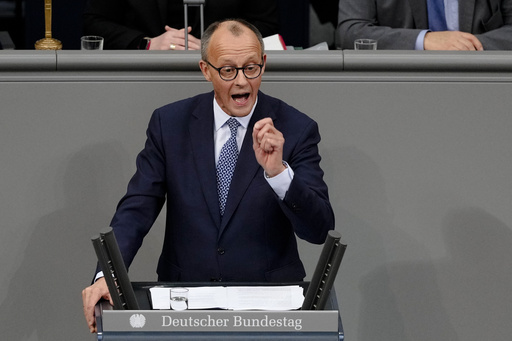
BERLIN — Four individuals are competing for the position of Germany’s next chancellor in an election set for Sunday. The candidates include the incumbent chancellor, the opposition leader, the current vice chancellor, and notably, a representative from a far-right political party seeking to make history.
Olaf Scholz, aged 66, has held the chancellorship since December 2021. He represents the center-left Social Democratic Party and boasts extensive governmental experience that includes prior roles as the mayor of Hamburg and in key ministerial positions in labor and finance. Scholz has faced significant challenges during his tenure, particularly in responding to crises that emerged following Russia’s invasion of Ukraine. He initiated efforts to enhance Germany’s military capabilities and positioned Germany as a major supplier of weapons to Ukraine. His administration has also focused on avoiding an energy crisis and addressing rampant inflation. However, his three-party coalition has been plagued by internal conflicts, which culminated in its disbanding in November during disputes over strategies to rejuvenate Germany’s economy, which has been contracting for two consecutive years.
Friedrich Merz is the 69-year-old leader of the opposition and front-runner in the electoral race, with his center-right Union bloc currently leading in voter polls. After the departure of long-serving Chancellor Angela Merkel in 2021, Merz took the reins of the Christian Democratic Union party. He has pivoted the party towards a more conservative agenda and has made the issue of tackling irregular migration a prominent focus of his campaign. Despite his leadership role, Merz has limited government experience; he entered the European Parliament in 1989 and became a member of the German legislature five years later. Following a hiatus from active politics after 2009, he worked as a lawyer and led the German division of the investment firm BlackRock.
Robert Habeck, who is 55, represents the Greens and currently serves as Germany’s vice chancellor and minister for economy and climate. With a background as a co-leader of the Greens from 2018 until 2022, he oversaw significant growth in the party’s popularity. However, he stepped aside in 2021 for Annalena Baerbock, now Germany’s foreign minister, to head the party’s first chancellor campaign. Habeck’s performance as a minister has received mixed evaluations, particularly regarding a controversial initiative aimed at replacing fossil-fuel heating with more sustainable options, which has sparked divisions within the governing coalition.
Alice Weidel, aged 46, is stepping into the spotlight as the first candidate from the far-right Alternative for Germany (AfD) to pursue the chancellor’s position. With a professional background as an economist, Weidel became involved with the AfD shortly after its formation in 2013. She has served as co-leader of the party’s parliamentary faction since its initial success in the national legislature in 2017 and took on the role of co-leader of the party itself in 2022, alongside Tino Chrupalla. In December, she was announced as the AfD’s chancellor candidate, although other political parties have made it clear that they will not collaborate with the AfD, limiting her prospects for a successful campaign.

